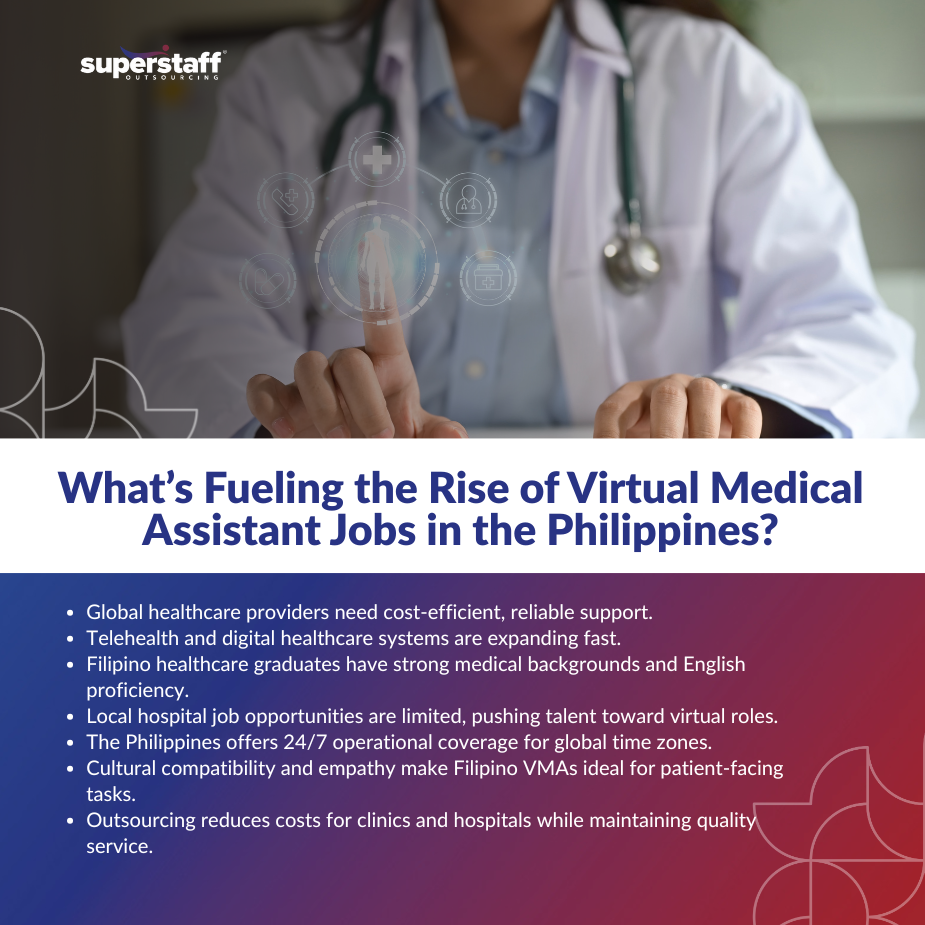
The global healthcare industry is evolving fast, and the demand for skilled support professionals is rising just as quickly. As hospitals, clinics, and private practices search for new ways to streamline operations and reduce burnout among in-house staff, one solution has gained impressive traction: virtual medical assistant jobs. These remote roles are transforming how healthcare providers manage patient care, scheduling, documentation, and billing—delivering round-the-clock support without the limitations of traditional setups.
In the Philippines, this growing demand meets an abundant supply of qualified healthcare graduates. Thousands of nurses, pharmacists, and allied medical professionals enter the workforce every year, many seeking career paths that allow them to apply their training in flexible, globally connected environments. Virtual medical assistant roles open that door, bridging the gap between the world’s healthcare staffing needs and the Philippines’ deep talent pool.
More than just an employment trend, virtual healthcare assistant jobs represent a new era of collaboration between healthcare institutions and Filipino professionals. This blog explores how these roles not only enhance operational efficiency for global healthcare providers but also create meaningful, sustainable career opportunities for skilled graduates across the Philippines.
Virtual Medical Assistant Roles Are Becoming Indispensable in Modern Healthcare
Healthcare has evolved beyond the physical walls of hospitals and clinics. Today, doctors and specialists rely heavily on remote administrative support to manage the increasing complexity of patient interactions, insurance processes, and digital documentation. This is where virtual medical assistant jobs come in.
Virtual medical assistants (VMAs) perform a wide range of essential functions. They handle patient scheduling, appointment confirmations, follow-ups, and reminders—ensuring that providers stay on top of their daily operations. They also manage electronic medical records (EMRs), verify insurance information, and process billing and claims. In some cases, they assist with scribing, transcription, and clinical data entry, helping physicians focus on what they do best: patient care.
The growing reliance on remote healthcare support has become a necessity rather than an option. With telehealth and hybrid care models gaining traction worldwide, medical practices need trained professionals who can handle both administrative and technical responsibilities virtually. Unlike traditional administrative staff who are limited by location and office hours, VMAs offer flexibility, scalability, and continuous support regardless of time zone differences.
Another key distinction between VMAs and traditional medical secretaries lies in their adaptability. To have a virtual medical assistant career, these professionals are trained to work with cloud-based healthcare systems, scheduling software, and secure data platforms—making them indispensable in the modern, digitized healthcare environment. Their ability to integrate seamlessly into digital workflows not only enhances productivity but also ensures compliance with global data privacy standards such as HIPAA.
These changing dynamics align perfectly with the Philippines’ growing reputation as a global hub for healthcare education and outsourcing. The country’s workforce, with its combination of medical background and strong digital literacy, is well-positioned to fill these high-demand roles and deliver exceptional service to global clients.

The Philippines Has a Surplus of Healthcare Graduates Who Are Well-Positioned for VMA Careers
Every year, thousands of nursing, pharmacy, and allied health students in the Philippines graduate from top universities, but only a fraction find employment in local hospitals due to limited openings. This imbalance has encouraged many skilled professionals to explore alternative healthcare-related career paths that allow them to apply their education meaningfully. Virtual medical assistant jobs have emerged as one of the most promising options.
Filipino healthcare graduates bring to the table not only their academic training but also a deep understanding of patient care, medical terminology, and ethical standards. These attributes are critical when supporting healthcare providers remotely.
Another reason for the growth of virtual medical assistant jobs for nursing graduates in the Philippines is their strong command of English and familiarity with Western culture. These skills make them especially effective in communicating with patients and medical professionals from the United States, Canada, and other English-speaking countries.
The Philippines’ competitive edge extends beyond language proficiency. Culturally, Filipino professionals are known for their empathy, patience, and adaptability—traits that are invaluable in healthcare settings where clear communication and compassion are essential. Patients and doctors alike appreciate the warmth and attentiveness that Filipino VMAs bring to every interaction.
Moreover, the Southeast Asian country’s educational system is closely aligned with Western medical standards, fueling the demand for healthcare outsourcing jobs in the Philippines and helps VMAs quickly adapt to the needs of international medical providers. Many nursing graduates undergo specialized training in electronic health record (EHR) systems, insurance verification, and U.S. healthcare compliance before joining outsourcing firms.
This combination of medical education, cultural compatibility, and global readiness makes Filipino talent highly attractive for healthcare organizations looking to expand their virtual teams. But beyond the talent pool, virtual medical assistant jobs also deliver tangible business advantages for providers navigating a fast-changing healthcare economy.
Virtual Medical Assistants Offer Cost-Effective and Efficient Solutions for Global Healthcare Providers
Running a medical practice involves significant overhead costs—from salaries and office space to technology and compliance management. Outsourcing administrative and operational tasks to the Philippines through virtual medical assistant jobs provides healthcare providers a cost-effective way to maintain efficiency without compromising quality.
By hiring VMAs, clinics and hospitals can reduce labor expenses by up to 60% compared to employing in-house administrative staff in high-cost countries like the United States. These savings extend beyond salaries. Providers eliminate expenses related to training, benefits, insurance, and physical infrastructure. Outsourcing partners in the Philippines take on recruitment, onboarding, and technology integration, ensuring that VMAs are fully equipped to perform their roles effectively from day one.
Moreover, outsourcing enables healthcare organizations to offer 24/7 patient care. With time zone advantages, Filipino VMAs can handle overnight administrative tasks, appointment scheduling, and after-hours inquiries while local staff rest. This round-the-clock operation improves patient satisfaction and ensures that no critical communication goes unanswered.
The cost savings achieved through outsourcing can also be redirected toward growth and innovation. Many healthcare providers use these freed-up resources to invest in new medical technologies, expand their telehealth services, or improve patient engagement initiatives.
Beyond finances, the efficiency of virtual medical assistant jobs lies in their flexibility. Providers can scale teams up or down depending on patient volume, seasonal demand, or practice growth. This flexibility ensures operational stability even during unpredictable shifts in the healthcare market.
In essence, the benefits of outsourcing medical assistant roles extend far beyond reducing costs. They enable healthcare organizations to deliver faster, more responsive, and more reliable services—all while empowering Filipino professionals with meaningful work opportunities.
VMA Careers Provide Filipino Healthcare Graduates With a Sustainable and Fulfilling Career Path
For Filipino healthcare graduates, virtual medical assistant jobs are not just a temporary solution—they represent a long-term and sustainable career path. Unlike traditional hospital roles that often involve long hours and high stress, VMA positions offer flexibility, work-life balance, and the chance to work in professional environments that value both skill and empathy.
These careers provide competitive compensation packages that allow Filipino professionals to enjoy financial stability while working from home or modern outsourcing facilities. With consistent demand from global healthcare providers, VMAs enjoy job security and the potential for career growth. Many start as administrative assistants and progress to supervisory or specialized roles such as medical billing specialists, clinical data coordinators, or telehealth support leads.
Exposure to international healthcare systems also enhances a VMA’s professional development. Working with U.S.-based physicians and healthcare networks helps Filipino professionals gain insights into advanced medical technologies, patient management systems, and industry best practices. This international exposure not only broadens their expertise but also strengthens their competitiveness in the global job market.
Another advantage is the growing emphasis on continuous learning within the industry. Many outsourcing firms offer certification programs and training opportunities in HIPAA compliance, electronic health records management, and communication skills. These upskilling initiatives enable VMAs to specialize and advance in their careers, further solidifying their role as trusted partners in healthcare delivery.
At its core, the success of virtual medical assistant jobs in the Philippines reflects a broader trend of inclusive growth. It empowers professionals to pursue fulfilling careers while contributing to the global healthcare ecosystem. As more Filipinos build their futures through these opportunities, the industry itself becomes a cornerstone of the country’s knowledge-based economy.
The Future of Virtual Medical Assistant Jobs in the Philippines Looks Promising for Both Talent and Employers
The future of virtual medical assistant jobs in the Philippines is bright—and it’s only getting stronger. With telehealth adoption accelerating worldwide, healthcare organizations are actively expanding their virtual workforce. Outsourcing firms in the Philippines are responding by developing specialized training programs that prepare VMAs to handle more complex responsibilities, including clinical documentation, teleconsultation support, and patient data analytics.
As global healthcare systems become more digitized and interconnected, the demand for reliable, English-speaking, and medically trained professionals will continue to grow. Filipino VMAs are uniquely positioned to meet that demand thanks to their combination of technical competence and compassionate service.
Healthcare organizations are also beginning to recognize the strategic value of offshoring beyond cost savings. Building offshore VMA teams in the Philippines gives them access to a stable, scalable, and quality-driven workforce that can adapt to shifting market conditions. This has led to partnerships between U.S. healthcare providers and Philippine outsourcing firms, creating a win-win ecosystem of shared growth.
The next wave of growth will come from specialization. As healthcare providers seek more targeted expertise, roles such as medical scribe specialists, patient experience coordinators, and insurance claims processors will become increasingly common. This diversification allows Filipino VMAs to continue growing professionally while providing greater value to their employers.
The convergence of technology, education, and opportunity ensures that the Philippines will remain a global leader in virtual healthcare support. This thriving sector benefits not only Filipino workers but also patients and providers across the world who rely on efficient, empathetic, and reliable assistance every day.
Turn to SuperStaff for Virtual Medical Assistant Jobs in the Philippines
Virtual medical assistant jobs are redefining the way healthcare works. They serve as a bridge between the growing global demand for administrative efficiency and the Philippines’ strong supply of skilled medical graduates. This collaboration delivers value on both ends—empowering healthcare providers to streamline their operations while enabling Filipino professionals to build stable, rewarding careers.
The rise of virtual medical assistants underscores the Philippines’ evolving role in the global healthcare landscape. With its combination of medical expertise, cultural empathy, and digital fluency, the country continues to prove that world-class healthcare support doesn’t have to be bound by geography.
As healthcare organizations look for reliable partners to enhance patient care and efficiency, now is the time to explore what the Philippines has to offer.
Partner with SuperStaff to build skilled, dedicated virtual medical assistant teams that strengthen your operations and bring better care to every patient, every day.
Wondering how to become a virtual medical assistant in the Philippines? Check out our Careers page for job opportunities.






